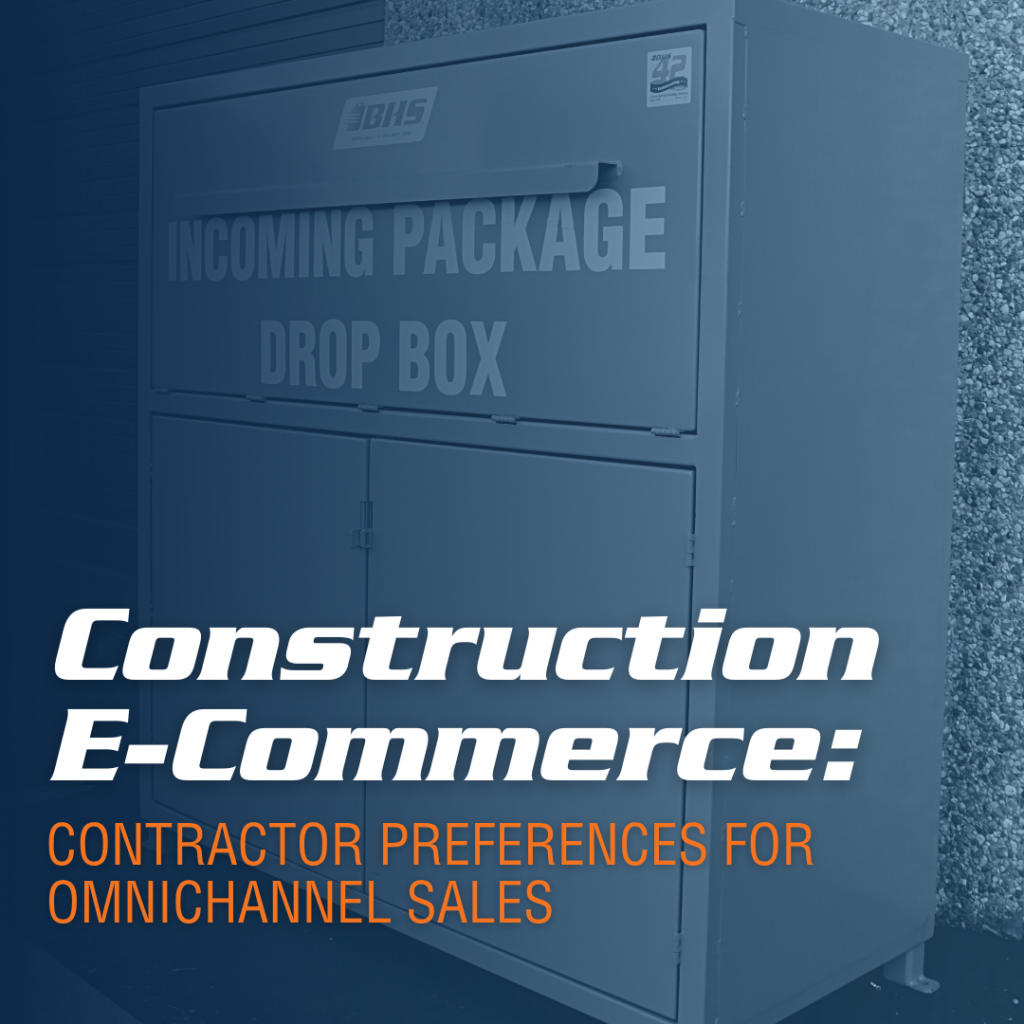We use cookies to make your experience better. To comply with the new e-Privacy directive, we need to ask for your consent to set the cookies. Learn more.
Construction E-Commerce: Contractor Preferences for Omnichannel Sales
As e-commerce continues to grow across verticals, construction contractors have begun to expect it from their distributors, too. In one survey from HMI Performance Incentives, 75 percent of contractors in the electrical, building, plumbing, HVAC, landscaping, and roofing industries said they bought at least some of their materials online. Perhaps more alarmingly for traditional distributors, 66 percent said they patronized online-only sellers — including major construction e-commerce disruptors like Amazon, Zoro.com, and Supplyhouse.com.

But not everything in the materials distribution industry has changed. Most contractors in the survey (72 percent) said more than three quarters of their material spend goes to distributors, not hardware chains or direct-selling original equipment manufacturers. And the personal relationships that have always driven industry growth are still a key differentiator for distributors. Researchers from HMI asked contractors which factors were most important in their choice of material provider. The most frequently cited factor was “the relationship, and trust, that you have with the distributor’s inside sales staff.”
It’s just this personalization that the huge online-only sellers lack. The ideal distributor for many of today’s contractors is probably not Amazon; it’s a specialized provider that combines the one-on-one service of a traditional wholesaler with advanced digital capabilities. In other words, distributors must offer an omnichannel experience with a personal touch.
Construction Material E-Commerce as Part of an Omnichannel Approach
Omnichannel sales refers to a consistent customer experience across multiple touchpoints, which may include any or all of the following (or more):
- In-person conversations, as at a brick-and-mortar location
- Telephone interactions
- Websites
- Mobile apps
- Online chatbots
- Conversational AI, such as branded smart speaker apps
In an omnichannel strategy, distributors offer their clients multiple modes of service, including both traditional (in-person, telephone) and digital (apps, chatbots) points of contact. And this omnichannel strategy is already becoming the norm in business-to-business (B2B) sales, including in the construction industry. According to McKinsey, more than 80 percent of B2B leaders say omnichannel is “as or more effective than traditional [sales] methods.”
Clearly, construction e-commerce is one key element of a successful omnichannel approach for material distributors — especially since the pandemic accelerated the shift toward remote interactions. Before the pandemic took hold, only 54 percent of B2B executives rated the effectiveness of omnichannel as equal to or better than traditional sales, reports McKinsey. By February 2021, that figure stood at 83 percent.
So there’s no question that distributors must offer an online store to contractors. The question is, once you’ve entered the digital omnichannel space, how do you compete with online-native giants like Amazon Business? Here are a few ways to stand out from the crowd in the building materials e-commerce industry:
1. Offer customized delivery systems.
As we’ve seen since the pandemic, supply chains can break down at a moment’s notice. Construction contractors need to know their materials will be available when they need them. Lessons from business-to-consumer (B2C) retail can help out here. Post industrial parcel lockers like the Will Call Dropbox outside your facility to allow contactless, 24/7 pick-up. Combine this capability with your online store to create a “buy online, pick up in store (BOPIS)” system.
Another option is to post delivery lockers at a customer’s job site for overnight, asynchronous deliveries. Use smart parcel lockers to automate access codes and provide real-time tracking for delivered orders. Offer all these choices to customers so they can create a personalized delivery experience that solves their unique challenges.
2. Provide materials as delivered solutions.
Rather than completing last-mile delivery on pallets or in boxes, load materials onto work-ready carts to save customers time and money. This approach is called a “delivered solution,” and it’s a powerful incentive, especially in the electrical industry.
Deliver cable orders pre-loaded onto Parallel Reel Payouts for straight-off-the-truck pulls. Bulk lighting orders can ship on Light Fixture Carts, fully unboxed and ready for installation. That saves electricians time and waste at the job site. Load conduit orders onto a Conduit Carrier Cart for quick access anywhere in the building. And those are just a few of the options.
3. Give customers a wide range of value-added services.
Online-only B2B sellers operate at tremendous scales, making personalization difficult for them. Distributors who operate only in the construction industry are free to specialize, with time-saving customizations that help them compete. Electrical wholesalers can offer custom wire-cutting, paralleling, and dyeing — and they can fill these custom requests efficiently with the digital order management capabilities of the Spool Winding Trolley - Industrial internet of Things.
These tips are sure to set you apart from the digital enterprises that are entering the construction distribution market. Ultimately, however, competition will depend on human factors: ongoing, positive relationships between your inside sales team and individual contractors. As your sales strategy evolves to include construction e-commerce, continue to facilitate meaningful interactions with your in-house experts — including through the digital channels that make omnichannel sales possible.
